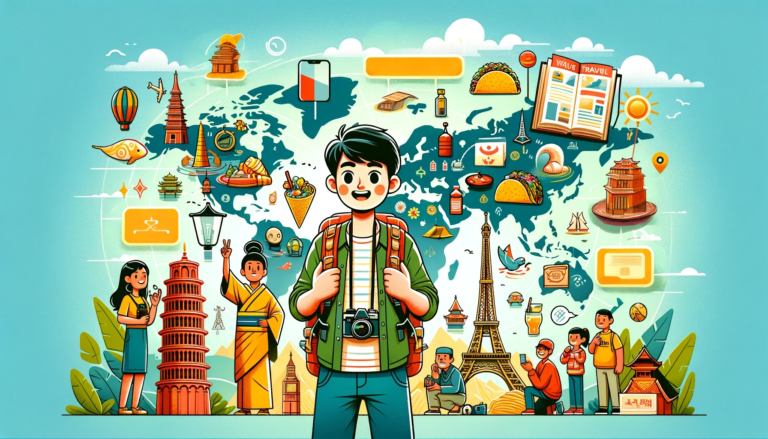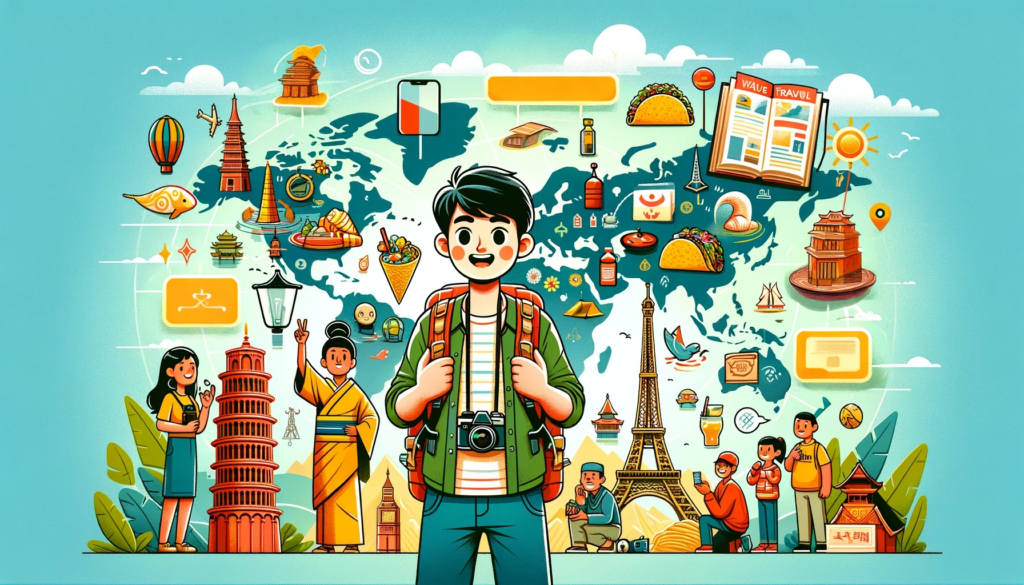Exploring Cultures: Travel Tips for Beginners A1
- Home
- »
- English Teaching Resources
- »
- A1 – Elementary
- »
- Exploring Cultures: Travel Tips for Beginners | A1
This is a free A1 elementary level English reading lesson about traveling. It includes the reading and reading comprehension exercises in 4 different formats together with the answer keys and explanations.
- True/False questions
- Multiple choice questions
- Short answer questions
- Multiple choice cloze exercise

Exploring Cultures: Travel Tips for Beginners

Table of Contents
Exploring Cultures: Travel Tips for Beginners
Travel is fun. It is exciting. Travel is also new. You see different places.
Start simple. Choose one place. Learn a few words. Hello. Please. Thank you. Goodbye.
Pack light. Take a small bag. Bring simple clothes.
Use a map. Maps help a lot. Ask people for help. Most people are friendly.
Take photos. Make memories. Write a diary. Share stories.
Be safe. Watch your things. Listen to advice. Enjoy your trip.
CEFR Level Card
General Level: A1.4
Vocabulary: A1.0
Verb Forms: A1.0
Sentences: A1.2
Vocabulary
diary NOUN A2 x1
Definition (En):
- a daily written record of (usually personal) experiences and observations
n. a personal journal (as a physical object)
fun ADJ A2 x1
Definition (En):
- activities that are enjoyable or amusing
n. verbal wit or mockery (often at another’s expense but not to be taken seriously)
n. violent and excited activity
memory NOUN A2 x1
Definition (En):
- something that is remembered
n. the cognitive processes whereby past experience is remembered
n. the power of retaining and recalling past experience
n. an electronic memory device
pack VERB A2 x1
Definition (En):
- a complete collection of similar things
n. a convenient package or parcel (as of cigarettes or film)
n. a group of hunting animals
n. a cream that cleanses and tones the skin
simple ADJ A2 x2
Definition (En):
- any herbaceous plant having medicinal properties
a. having few parts; not complex or complicated or involved
a. (botany) of leaf shapes; of leaves having no divisions or subdivisions
s. unornamented
Phrases
PHRASE | COUNT | SENTENCES |
pack light | 1 |
|
Reading Comprehension Exercises
True / False
- Travel is only fun and not new.
- You should learn many words before you go.
- When you travel, you should carry a big bag.
- Maps are not useful for traveling.
- Most people you ask for help are nice.
- Taking pictures is a good way to keep memories.
- You should not listen to other people’s advice while traveling.
Multiple Choice
1) Why should you pack light?
A) To have more things.
B) To save space.
C) To spend more money.
D) To lose your bag.
2) What can you do to remember your trip?
A) Forget the trip.
B) Take photos.
C) Throw away your map.
D) Stop traveling.
3) Why should you use a map when traveling?
A) Because you should sell the map.
B) Maps are not useful.
C) Maps can guide you.
D) Everyone uses a map.
4) What should you do if you need help?
A) Never ask anyone.
B) Ignore everyone.
C) Ask people for help.
D) Run away.
5) Why is travel exciting?
A) It is boring.
B) You can’t go anywhere.
C) Travel is fun.
D) It is always the same.
6) What should you say to people in a new place?
A) Say nothing.
B) Yell at them.
C) Learn a few words.
D) Ignore everyone.
7) What is important for safety during your trip?
A) Lose your things.
B) Ignore all advice.
C) Watch your things.
D) Travel without plans.
Short Answer
- Why should you use a map when you travel?
- What should you do if you need help during your trip?
- What type of clothes should you bring when you travel?
- What should you do to have memories of your trip?
- What should you learn before you travel to a new place?
- Why should you be careful with your things while traveling?
- What should you do to share your travel experience with others?
Multiple Choice Cloze
Travel is ___1___. It is ___2___. Travel is also ___3___. You see ___4___ places.
Start ___5___. Choose one place. Learn a few words. Hello. Please. Thank you. Goodbye.
Pack ___6___. Take a small bag. Bring simple clothes.
Use a map. Maps help a lot. Ask people for ___7___. Most people are friendly.
Take photos. Make memories. Write a diary. Share stories.
Be safe. Watch your things. Listen to advice. Enjoy your trip.
1) A. sad B. big C. fun D. fast
2) A. tiring B. exciting C. boring D. difficult
3) A. new B. old C. ugly D. dirty
4) A. different B. same C. few D. many
5) A. happy B. simple C. finished D. tired
6) A. heavy B. dark C. light D. hard
7) A. money B. help C. time D. food
Exercise Answers
True / False Answers
- False
Explanation: The text says travel is fun and new, not just fun.
(“Travel is fun. It is exciting. Travel is also new.”)
- False
Explanation: The text suggests learning only a few words.
(“Learn a few words. Hello. Please. Thank you. Goodbye.”)
- False
Explanation: The text advises to take a small bag, which means not to carry a big bag.
(“Pack light. Take a small bag.”)
- False
Explanation: The text says maps help a lot, which means they are useful.
(“Use a map. Maps help a lot.”)
- True
Explanation: The text indicates that most people are friendly when you ask for help.
(“Ask people for help. Most people are friendly.”)
- True
Explanation: The text suggests that taking photos is related to making memories.
(“Take photos. Make memories.”)
- False
Explanation: The text encourages you to listen to advice.
(“Listen to advice.”)
Multiple Choice Answers
- B
Explanation: The text suggests packing light to avoid carrying a big, heavy bag.
(“Pack light. Take a small bag.”)
- B
Explanation: Taking photos is a way to make memories and remember the trip.
(“Take photos. Make memories.”)
- C
Explanation: The text explains that maps are helpful for guidance.
(“Use a map. Maps help a lot.”)
- C
Explanation: The text suggests asking people for help because they are friendly.
(“Ask people for help. Most people are friendly.”)
- C
Explanation: The text directly states that travel is exciting because it is fun.
(“Travel is fun. It is exciting.”)
- C
Explanation: The text advises to learn a few words to say to people in a new place.
(“Learn a few words. Hello. Please. Thank you. Goodbye.”)
- C
Explanation: The text emphasizes the importance of watching your things for safety.
(“Be safe. Watch your things.”)
Short Answer Answers
- Maps help a lot.
Explanation: The text suggests that a map is useful because it helps a lot during travel.
(“Use a map. Maps help a lot.”)
- Ask people for help.
Explanation: The text advises to ask people for help if you need assistance.
(“Ask people for help.”)
- Simple clothes.
Explanation: The text recommends to bring simple clothes for travel.
(“Bring simple clothes.”)
- Take photos.
Explanation: Taking photos is suggested as a way to make and keep memories of the trip.
(“Take photos. Make memories.”)
- A few words.
Explanation: The text suggests learning a few words such as ‘Hello’, ‘Please’, ‘Thank you’, and ‘Goodbye’ before going to a new place.
(“Learn a few words. Hello. Please. Thank you. Goodbye.”)
- Be safe.
Explanation: The text implies that watching your things is part of being safe during travel.
(“Watch your things.”)
- Write a diary.
Explanation: Writing a diary is suggested as a way to share your travel stories with others.
(“Write a diary. Share stories.”)
Multiple Choice Cloze Answers
- C
Explanation: The correct word is ‘fun’, which describes travel as enjoyable.
- B
Explanation: The correct word is ‘exciting’, meaning travel is thrilling.
- A
Explanation: The correct word is ‘new’, indicating travel involves new experiences.
- A
Explanation: The correct word is ‘different’, referring to diverse places.
- B
Explanation: The correct word is ‘simple’, suggesting a straightforward beginning.
- C
Explanation: The correct word is ‘light’, indicating not to bring too many things.
- B
Explanation: The correct word is ‘help’, showing that one should seek assistance.
Craft your own reading lessons in minutes
On Cathoven, you can create readings and exercises tailored to specific vocabulary, grammar points, and proficiency levels, all within minutes.


